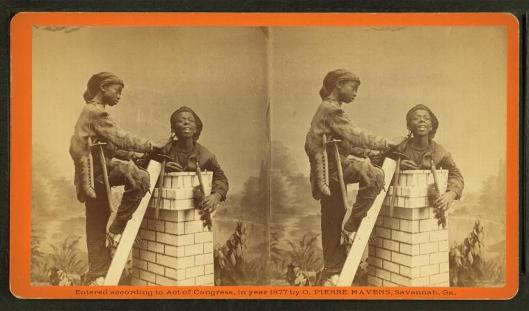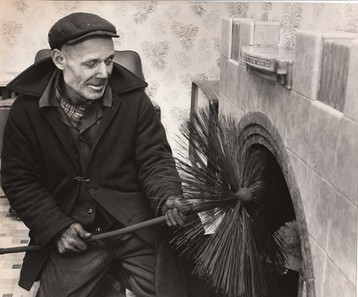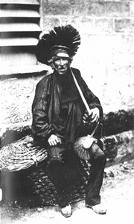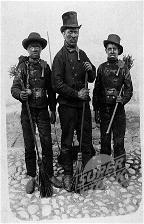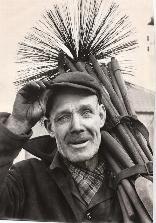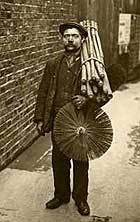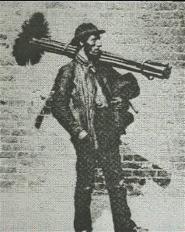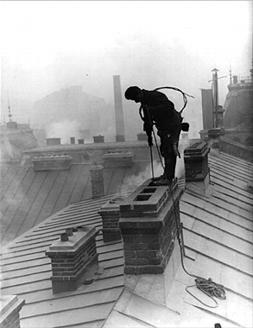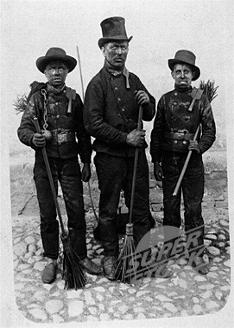
A Brief History of Our Craft
It was understood, even in the Georgian period of our history, that chimneys had to be regularly cleaned. Way back in the 17th century the "Master Sweep" would employ small boys to climb and scramble up chimneys. These "climbing boys" attempted to brush clean the inside of the flue with small, hand held brushes and metal scrapers to remove soot and the harder tar deposits left by wood and log fire smoke.
The boys were apprentices and were bound to the trade as young as seven years old. The Master Sweep was paid a fee to cloth, keep and teach the child his trade. Sweep boys were usually parish children or orphans although others were sold into the trade by their families. Some grew up to be journeymen (assistants to their master) the remainder were put out to various other trades to try and learn a new occupation.
In London the "London Society of Master Sweeps" had its own set of rules, one of which was that boys were not required to work on Sundays but had to attend Sunday school to study, learn and read the bible. However, conditions for the boys were harsh and often cruel; records from the time indicate that sweep boys often slept in cellars on bags of soot and were seldom washed. The years of accumulated soot and grime often produced cancers and other diseases (today soot is recognised as a carcinogenic).
It was a dangerous and filthy job for the boys to undertake, especially without the protection of safety clothing and respirators. Sadly there are recorded incidents of boys being choked and suffocated to death by dust inhalation whilst attempting to clean chimneys. Casualties were also frequent as boys became stuck in narrow flue ways, or fell as rotten chimney stacks collapsed.
It took many years and campaigns before acts of parliament, finally approved by the House of Lords, outlawed the use of climbing boys. In 1864, Lord Shaftsbury introduced the act for the "regulation of chimney sweeps" which not only laid down basic standards but also established penalties for offenders.
The outlawing of climbing boys prompted innovation within the industry which saw various types of sweeping equipment and methods for cleaning chimneys developed. An engineer from Bristol, Mr Joseph Glass (widely recognised as the inventor of chimney sweeping equipment) designed and introduced canes and brushes originally made of Malacca and whale bone which could be pushed and propelled from the fireplace into the chimney above. This method revolutionised the sweeping industry and although modern materials have replaced Malacca and bone, this system is still widely regarded as the best method for cleaning chimneys today.
An alternative method of cleaning chimneys first developed in Europe, involved a ball, brush and rope system. The ball was lowered down from the top of the chimney with the weight of the ball, which was typically made from lead or iron, forcing the brush down and thus cleaning the chimney. This procedure is still widely used in Scotland today, probably due to the close historical links between Scotland and Europe at the time of development.
With the onset of the industrial revolution and an even greater demand for coal, chimney sweeps began to grow in numbers, in Victorian London there were over 1000 sweeps serving the Capital during this time.
The continued expansion of coal as the main fuel for domestic heating ensured that the sweeping trade flourished up to the early 1960's, when gas began to be installed. The switch to gas continued into the 70's and many of the old established family sweeps retired or gave up the business.
Public awareness of the need for clean, safe and clear chimneys became almost non - existent which lead to an increase in Carbon Monoxide related deaths due to blocked and poorly maintained appliances and flues. Even today, according to the Health and Safety Executive (HSE) around 20 people will die this year because of faulty installations or the poor maintenance of appliances and flues.
Modern advancements in heating appliances, which has meant a more efficient, cleaner burn of solid fuels, together with the increasing cost of gas and electricity, has lead to a mini revival in solid fuel appliance installations and with it, a revival of the chimney sweeping trade.
Contact Us
H: 01507 607344
M: 07932743905
E: andylynch434@btinternet.com

